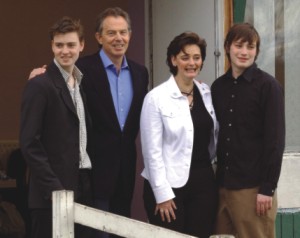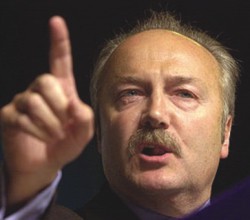|
International
Blair
Gets a Bloody Nose for Iraq
Tony
Blair has won his longed-for third election victory and
secured his place in history. But the prime minister must
know that, for the first time, it was despite, rather than
because of him.
 The
victory came on the back of the smallest winning share of
the vote recorded. And with a vastly reduced majority and
both the Tories and the Liberal Democrats making significant
advances at Labour's cost, the celebrations in Downing Street
was short. The
victory came on the back of the smallest winning share of
the vote recorded. And with a vastly reduced majority and
both the Tories and the Liberal Democrats making significant
advances at Labour's cost, the celebrations in Downing Street
was short.
All
eyes will now focus on the prime minister's future - and
what many believe is the near-inevitability of a handover
to Gordon Brown well before the end of this third term.
Iraq dogged the prime minister throughout the campaign and
many in Labour believe only a change in leader can draw
a line under this episode
The
sight of Stephen Twigg suffering role reversal and losing
the seat he so sensationally took from Michael Portillo
in 1997 and fellow minister Melanie Johnson falling will
have pained Blair.
But
perhaps the moment that will have rocked him the most will
have been when Respect Party's George Galloway ousted Oona
King after a campaign based almost entirely on anti-war
sentiments. Galloway's successful and bitter single-issue
campaign to oust King from one of the most Muslim seats
in the country has secured his place in British political
history. It has also given us a return of sorts to the political
street-fighting that once made London's East End such a
volatile electoral mix.
King
entered the Commons in 1997 with a majority she went on
to increase in 2001. A member of the "Blair Babes",
she was media savvy and a high profile MP for some of the
poorest people in the country. But eight years on, those
constituents have punished her closeness to the Prime Minister
-- not over the bread-and-butter East End issues of jobs
and housing -- but over her support for the war in Iraq.
And
so it was to the cheers of his supporters that the new member
for Bethnal Green and Bow declared: "Mr Blair, this
is for Iraq." Galloway lost the party whip in 2003
over his refusal to toe the line over Iraq.
Here
was a Labour man who had called the Prime Minister a liar
long before it emerged as a bright campaign idea in the
Tory campaign bunker. But it was no accident that he then
chose Bethnal Green and Bow as his last stand against the
party that rejected him. With close on 45,000 Muslim residents
-- and Muslims at the forefront of those opposed to the
Iraq war -- it was Galloway's best chance to bloody Tony
Blair's nose.
Forming
his own anti-war Respect Party, he called a large number
of Muslim volunteers to the constituency - many of them
heavily experienced members of the anti-war movement. The
Muslim Association of Britain, an organisation which predominantly
campaigns on Palestinian and Iraqi issues, swung behind
Mr Galloway with a large number of enthusiastic campaigners,
including well-connected local mosque workers eager to make
their voice heard.
Many
observers thought that this race was too close to call;
if Mr Galloway was relying on the Muslim vote, the question
was whether he could persuade the solidly working class
Labour section of this community to come on board. The contest
also appeared likely to split the vote, if faith was the
issue for voters, as both the Liberal Democrats and Conservatives
put up well-known local Muslim figures.
But
the first hustings very quickly demonstrated this was going
to be a title-fight between Galloway and King -- and not
a particularly edifying spectacle at that. Galloway raised
the temperature at that first clash by accusing the government
of being part of a "war on Muslims". While King
said her support for Saddam Hussein's overthrow had been
principled, Galloway said his candidature represented the
"ghost of Labour's past" come back to haunt her.
Yet
as the debate continued, the comments became more vitriolic.
"What
makes me sick is that when I come across someone who is
guilty of genocide I do not get on a plane and go to Baghdad
and grovel at his feet," said Ms King, referring to
Mr Galloway's controversial meeting with Saddam Hussein
11 years ago.
Two
days before polling Mr Galloway walked out of an ITV interview
after the programme raised his visit to Saddam Hussein,
saying he had been set-up to appear a supporter of the former
dictator. Writing days before the vote, Mr Galloway predicted
Iraq would be Tony Blair's political tombstone. But as he
scraped home in the seat with a majority of less than 1,000,
the war also gave a new lease of life to one of the toughest
street-fighting rebels Labour has ever seen.
Iraq
dogged the prime minister throughout the campaign and many
in Labour believe only a change in leader can draw a line
under this episode. The prime minister himself acknowledged
the effect the war had had on his campaign during his victory
speech. He also echoed sentiments expressed by Gordon Brown
earlier when he spoke about the need to listen to people's
concerns.
Meanwhile,
both Michael Howard and Charles Kennedy had reason to be
happy with their results. The Tories may not have made a
breakthrough of the size many were dreaming of.
But
Michael Howard was happy enough with his showing to declare
his party had taken a significant step towards recovery.
There will be speculation over his own leadership plans
but he has done enough to avoid instant demands for his
resignation.
 In
any case there is a widespread feeling amongst Tories that
they do not want the sort of resignation William Hague made
after the 2001 poll. Similarly, Kennedy will be delighted
with his showing and the likelihood of ending up with more
Commons seats than at any time for the Liberal Democrats
since Lloyd George. In
any case there is a widespread feeling amongst Tories that
they do not want the sort of resignation William Hague made
after the 2001 poll. Similarly, Kennedy will be delighted
with his showing and the likelihood of ending up with more
Commons seats than at any time for the Liberal Democrats
since Lloyd George.
He
will see the result as a solid staging post towards his
ambition to make the Lib-dems the real opposition, in time
for the next general election.
There
was a time, of course, when a majority of over 60 would
have been seen as a major success for Labour, or even the
Tories at their prime. But there will be no getting away
from the fact that Mr Blair will now have a far more difficult
time than before in getting his programme through Parliament.
That
will only add to the speculation over his leadership. And
there must be doubts about him remaining in Downing Street
for the full term, as he has insisted he will do. As soon
as the smoke has cleared from this election battle, that
is the story most likely to now dominate politics.
This
article is compiled from various sources on the Internet.
Copyright
(R) thedailystar.net 2005
|
